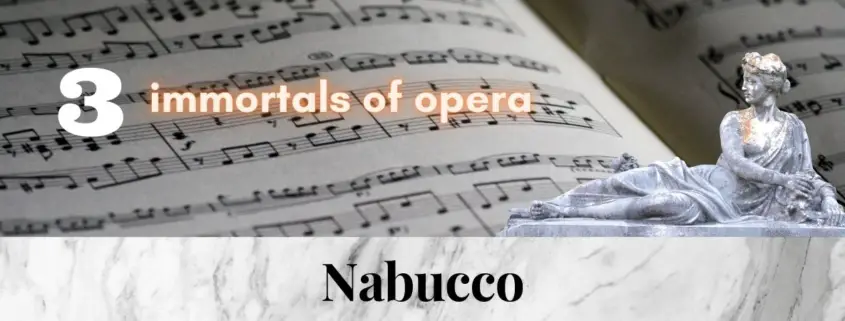3 immortal pieces from the opera NABUCCO by Verdi – with the best interpretations from YouTube (Hits, Best of)
Nabucco was Verdi’s first work for Olympus. After the bitter years of 1838-40, overshadowed by crises, it was Verdi’s return to the light. Verdi displayed a gigantic wealth of ideas in Nabucco, and the work became a sensational success. He later called the incipient seventeen-year creative frenzy “his galley years.”
Ismael betrays his fatherland
Verdi shows himself to be a sophisticated psychologist at an early age in the tercet of Ismael, Abigaille and Fenena: with the short recitative he presents Abigaille as a power-driven potentate. At the beginning of the following tercet, she documents her claim to power over Ishmael with great leaps of tone and a memorable theme. Intimidated, Ishmael takes up her theme. When Fenena enters with a beautiful, beckoning theme, Ishmael is smitten and sways to Fenena’s melody. Abigaille is not ready for this and she sings her melody in counterpoint to the unison duet of Ishmael and Fenena.
An interpretation with Elena Suliotis as Abigaille.
Prode guerrier…Io t’amava – Suliotis/Raimondi/Guelfi
Abigaille – a highly dramatic role
With a frenetic entrance, Abigaille shows her true character in this cabaletta “Salgo già”, musically best documented by the mad fall over two octaves of the “Supplicar” before the chorus enters.
Hear this passage in a version by an unleashed Maria Callas in a 1949 recording.
Salgo già – Callas
“Va pensiero”
The enslaved Hebrews surely renounce their homeland and ask God’s help.
For political reasons, this chorus is taken as a freedom hymn or a prisoner’s chorus. However, this reality is not quite complete as it is also the farewell to life, for the Jews are affected by Abigaille’s death sentence and bid farewell.
Va pensiero – NN







Leave a Reply
Want to join the discussion?Feel free to contribute!